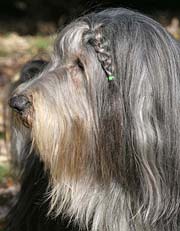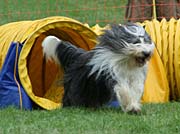Disorders such as hypothyroidism and autoimmune diseases are increasingly being diagnosed in all breeds, and the Beardie is no exception. In Beardies the most commonly occurring autoimmune disorder is Addison's Disease, a condition in which the adrenal glands cease working. Symptoms tend to be vague and non-specific – lack of appetite, weakness, lethargy, sometimes rear end weakness, and excessive thirst - and can easily be assumed to be something far less severe (and it should be mentioned that Beardies can be notoriously picky eaters, often ‘living on air’ during the teenage stage, so if your Beardie doesn’t seem to have much of an appetite but otherwise seems perfectly fine, it really isn’t cause for concern). Stress seems to aggravate the disease and there may be several minor episodes during stressful times which go unnoticed, and are only recalled in hindsight once the dog has a full-blown Addisonian crisis and is diagnosed. Although Addison's is life threatening, if diagnosed in time and treatment started it can be managed with medication, with many Addisonian dogs living full long lives.
Autoimmune Hemolytic Anemia, or AIHA (also called Immune Mediated Hemolytic Anemia, or IMHA) is another immune disorder that has occurred in Beardies. In this disease the body attacks its own red blood cells, leaving the dog weak, pale, and very sick in a short period of time. This is a more difficult disease to treat, as some dogs respond well to treatment and others will not, and even in those dogs who appear to be on the road to recovery, relapses are an ever present concern.
Additional immune disorders such as Lupus, Pemphigus, or Thrombocytopenia, have also occurred in Beardies (and many other breeds). None of this is mentioned with the intention to scare, or dissuade someone from acquiring a Beardie. Most Beardies can be expected to lead long healthy lives and never encounter any of these problems, however awareness of these disorders can mean the difference between proper diagnosis and treatment, or not. Vaccination can be a trigger of autoimmune disorders in a susceptible dog, and as more and more information comes out on the efficacy of vaccines, the recommendation is changing from annual to every 3 years at most.
Beardies can be a sensitive breed, and one should be cautious in the use of harsh chemicals around them. If you won't let your children play on the lawn that was just sprayed with weed killer, then don't let your Beardie either! Flea sprays and other products, if needed, should be researched carefully to find the safest products and then used according to directions.
Some Beardies suffer from allergies, either seasonal, environmental, or food related. In these cases it is best to find a vet who is willing to work to find the cause of the allergen, since long term use of steroids to mask the symptoms - the traditional approach to treating allergies - can lead to side effects and future health problems.
Skin problems can occur in Beardies, generally in the form of dry flaky skin, itchiness, or rashes. Minor dry skin problems can be alleviated by using a humidifier in the house if the air is too dry; or adding fish oil or other supplements to the food each day.
Many Beardies have sensitive stomachs, so indiscriminate feeding of table scraps should be avoided. That’s not to say they can’t have extra ‘goodies’ put on their food, but they should be added in small amounts until you know how the dog will tolerate them, and it goes without saying that these goodies should be healthy ones such as cottage cheese, yogourt, vegetables, etc.
Though health problems can occur in even the best of situations, it is my belief that with the Beardie being quite a sensitive breed mentally, many health issues can often be a reaction to stress.
All in all the breed is a healthy one, and if cared for properly the average lifespan is probably 12- 14 years, with many individuals living to 15 and 16 and beyond.
For more info on health issues in Beardies, visit the Bearded Collie Health Foundation website











